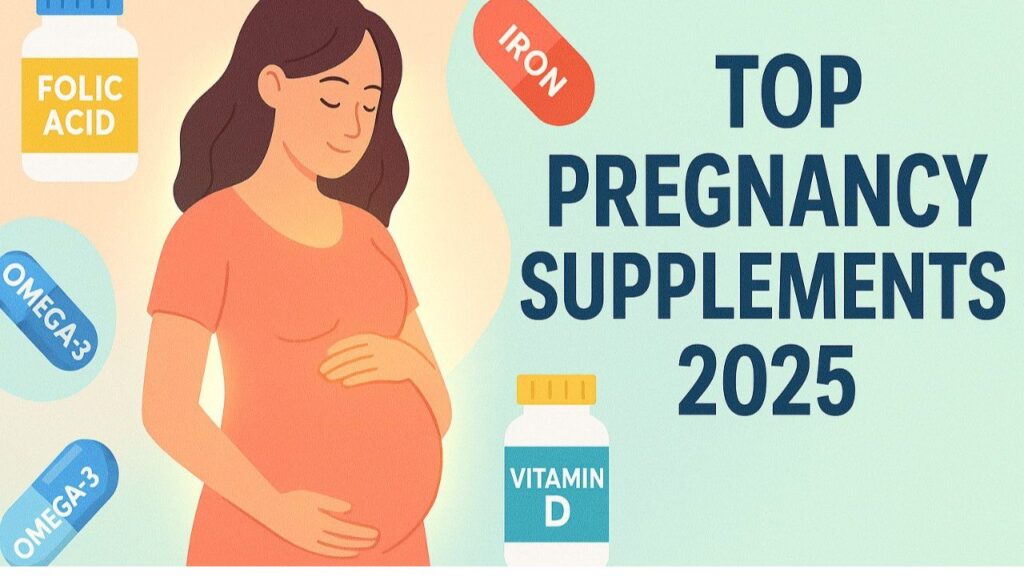Essential Vitamins | Doctor Recommended

Discover the top doctor-recommended supplements for women during pregnancy in 2025 to support health, boost energy, and ensure baby’s growth.
Becoming—and being—pregnant brings profound physiological changes. The nutritional needs of a woman increase significantly during pregnancy to support her own health and her baby’s growth. While a well-balanced diet is the foundation, in many cases supplementing with certain vitamins, minerals, and other nutrients becomes necessary or strongly beneficial. In this post, we explore the top supplements for women during pregnancy in 2025, how they work, evidence behind them, safety cautions, and strategies to stay consistent.
Read About Best Protein Powder for Muscle Gain in 2025
Why Supplements Matter in Pregnancy
During pregnancy, a woman’s body supports two lives. Nutrient demands rise: for blood volume expansion, increased bone turnover, formation of the placenta, fetal growth, and so on. Research shows that the levels of many vitamins decline during pregnancy if not supplemented, including vitamins A, C, D, K, B1, B3, B5, B6, folate, biotin, and B12. PMC+1
Because it is often difficult to meet all those increased needs via diet alone (due to nausea, food restrictions, absorption limitations, or local food availability), targeted supplementation helps “fill the gaps.” Major medical bodies (e.g., ACOG) recommend specific nutrients during pregnancy. ACOG+1
However, supplements are not magic pills. They complement—not replace—a whole-food, nutrient-dense diet. Also, excessive doses of some nutrients (especially fat-soluble vitamins or high levels of certain minerals) may be harmful, so medical supervision is essential.
Top Supplements to Consider (Doctor-Recommended)
Below is a list of key supplements often recommended during pregnancy, their roles, typical dosages (often), evidence support, and safety notes. Always check with your obstetrician or a qualified medical professional before starting or combining supplements.
| Nutrient / Supplement | Role & Benefits | Common Dose / Consideration | Evidence & Safety Notes |
|---|---|---|---|
| Folate / Folic Acid (Vitamin B9) | Prevents neural tube defects, supports DNA synthesis and red blood cell formation | 400–600 µg (micrograms) daily during preconception and first trimester; sometimes higher in certain risk groups | Taking folic acid before conception and during early pregnancy markedly reduces neural tube defects. PMC+4nhs.uk+4ACOG+4 Higher doses (e.g. 4–5 mg) may be prescribed in high-risk cases (history of NTDs, certain medications) — under medical supervision |
| Iron | Prevents iron-deficiency anemia (very common in pregnancy), supports increased blood volume | Often 30–60 mg elemental iron daily (as part of prenatal formula or separate) | Iron deficiency anemia in pregnancy is linked to fatigue, preterm birth, low birth weight. Many prenatal multivitamins include iron. PMC+3ACOG+3Office of Dietary Supplements+3 Gastrointestinal side effects (constipation, nausea) are common; taking with food or dividing doses can help |
| Calcium | Supports fetal bone and teeth development, prevents maternal bone loss | ~1000 mg/day (in divided doses) depending on dietary intake | Calcium supplementation has been associated with reduced risk of preeclampsia in populations with low baseline calcium intake. PMC+2Office of Dietary Supplements+2 It’s optimal to balance calcium intake (from food + supplement) to avoid interference with absorption of iron or other minerals |
| Vitamin D | Aids calcium absorption, supports immune function, skeletal health | ~600–1000 IU (or more, depending on deficiency status) | Many pregnant women are deficient in vitamin D; supplementation can improve maternal and neonatal status. PMC+3Office of Dietary Supplements+3ACOG+3 Excessively high doses should be avoided; testing and monitoring can guide dosing |
| Iodine | Crucial for maternal and fetal thyroid hormone synthesis, neurodevelopment | ~220–250 µg daily (depending on region and dietary iodine availability) | Iodine deficiency in pregnancy can lead to impaired cognitive development in children. Many prenatal formulations include iodine. Office of Dietary Supplements+2ACOG+2 Too much iodine may also have risks, particularly in thyroid disease — medical oversight important |
| Choline | Supports fetal brain development and neural tube closure | ~450 mg/day (or more, depending on guidelines) | Choline is increasingly recognized as essential; many prenatal vitamins do not include enough choline. Office of Dietary Supplements+2PMC+2 Supplementation may reduce neural defects and support cognition, but more research is emerging |
| Long-Chain Omega-3 Fatty Acids (DHA / EPA) | Supports fetal brain and eye development, reduces risk of preterm birth | ~200–300 mg DHA (or combined DHA+EPA) or as advised | Meta-analyses and trials suggest omega-3 supplementation during pregnancy reduces preterm birth risk, increases gestation length, supports fetal growth. PMC+3PMC+3Office of Dietary Supplements+3 Choose sources low in heavy metals (e.g. pharmaceutical-grade fish oil, algal DHA) |
| Other B-Vitamins (B6, B12, Riboflavin, Niacin etc.) | Support energy metabolism, red blood cell formation, neurological health | Often included in prenatal multivitamins in balanced amounts | These are usually covered by prenatal formulations; deficits are rare if multivitamin is used — but check for adequacy. ACOG+2PMC+2 |
| Magnesium, Zinc, Selenium, etc. | Cofactors in many enzymatic and physiological processes | As included in comprehensive prenatal multivitamin / mineral formulations | In many populations, mild insufficiency is common. However, taking too much of certain trace minerals can interfere with absorption of others; a balanced formula is safer. Office of Dietary Supplements+2PMC+2 |
| Probiotic / Gut-supporting Supplements (optional) | Help maintain maternal gut health, may reduce risks of gestational diabetes, preterm birth | Choose strains and doses studied in pregnancy (e.g. Lactobacillus rhamnosus, Bifidobacterium) | Emerging evidence suggests benefits, but strain-specific and more research is needed. Use products with good quality control and clinically tested strains |
Putting It All Together: How to Choose and Use Supplements Wisely

1. Start Before or Early in Pregnancy
Many neural tube defects occur very early (weeks 3–4 of embryonic development). That’s why folate/folic acid is recommended to begin even before conception or as soon as pregnancy is known. nhs.uk+2PMC+2
2. Prefer Comprehensive Prenatal Formulas
Rather than taking many individual supplements, a high-quality prenatal multivitamin/mineral + omega-3 formula is often more convenient and balanced. Make sure it has appropriate amounts of the core nutrients (folate, iron, iodine, vitamin D, choline, etc.).
3. Tailor According to Local Needs
In India and similar settings, certain deficiencies are more common (e.g. iron deficiency, vitamin D deficiency). Public health guidelines often recommend iron + folic acid supplementation during pregnancy. danone.in+1 If your region is iodine-deficient, iodine becomes more important. Meanwhile, fairly safe sunshine availability may help with vitamin D, but many pregnant women are still deficient.
4. Monitor & Test
Get baseline and periodic blood tests (hemoglobin, ferritin, vitamin D, thyroid function etc.) so your doctor can adjust supplement doses. Over-supplementation can cause toxicity or negative interactions (e.g. excess vitamin A, too much iron). PMC+3nhs.uk+3Office of Dietary Supplements+3
5. Timing & Absorption Tips
- Take iron with vitamin C (e.g. a glass of orange juice) to improve absorption, but avoid taking with calcium or high-phytate foods at the same time.
- Take fat-soluble vitamins (A, D, E, K) with meals containing some fat.
- Split doses if gastrointestinal side effects bother you (e.g. iron in two halves daily).
- Try to maintain a routine (same time each day) to support consistency.
6. Beware of Overlaps, Toxicity & Contaminants
- Some prenatal vitamins, especially unregulated ones, have shown contamination with heavy metals (lead, arsenic, cadmium) or discrepancies in advertised vs actual content. Always pick high-quality, tested brands.
- Avoid retinol-form vitamin A (preformed A) in excess, as it’s teratogenic at high doses.
- Excessive micronutrients (e.g. very high selenium, zinc, vitamin E) can be harmful, especially in combination.
- Do not self-supplement herbs or botanical blends in pregnancy without explicit medical supervision.
Benefits You Can Expect (When Used Appropriately)
- Reduced risk of neural tube defects (with adequate folate)
- Lower chance of maternal anemia, improving maternal energy
- Stronger fetal bone development (with calcium + vitamin D)
- Better fetal brain, eye, and neural growth (with DHA, choline, iodine)
- Possible reduction of preterm birth risk (with omega-3)
- Overall maternal nutritional resilience and support during the high-demand state
These tangible benefits translate into greater confidence, lower pregnancy complications, and better beginnings for your baby.
Challenges & Cautions: Consistency & Realistic Expectations
While supplements are powerful tools, they are not miracle cures. Here are some challenges you may face:
- Daily consistency is essential: Missing days reduces cumulative benefit
- Side effects (nausea, constipation from iron) can make adherence hard
- Overwhelming pill burden: if you already take medications or other vitamins
- Cost and access: Some high-quality formulations can be expensive or not locally available
- False sense of security: Supplements cannot compensate for a poor diet, lack of sleep, stress, or other lifestyle deficits
- Medical contraindications: In certain conditions (e.g. preexisting liver disease, kidney disease, thyroid dysfunction), supplement regimens may need close custom adjustments
The ideal approach is to partner with your obstetrician, nutritionist, or certified prenatal specialist—review your diet, lab results, supplement plan, and adjust as needed.
Sample 2025 Prenatal Supplement Strategy (Illustrative)
Here’s how one might strategize supplementation (to be personalized with a doctor):
- From preconception / early pregnancy: 400–600 µg folic acid (or methylated folate) daily
- Choose a prenatal multivitamin/mineral that includes: iron (30–60 mg), vitamin D, iodine, B-vitamins, magnesium, zinc, etc.
- Add DHA / omega-3 (≈200–300 mg) if not included in your prenatal
- If tests show deficiency, adjust (e.g. extra vitamin D, iron, or choline) under guidance
- Monitor every trimester (or more) — blood count, vitamin D, thyroid, ferritin
- Reassess whether to continue or adjust postpartum or during lactation
Conclusion & Takeaway
In 2025, the fundamentals of pregnancy supplementation remain largely consistent with prior guidelines—but with increasing appreciation for nutrients like choline and enhanced scrutiny over purity, bioavailability, and safety. The best strategy is to choose high-quality, doctor-recommended formulations; start early; tailor based on your labs and region; and remain consistent. Supplements can provide that extra layer of support—boosting your energy, resilience, and confidence during pregnancy—while working hand in hand with mindful nutrition and medical supervision.